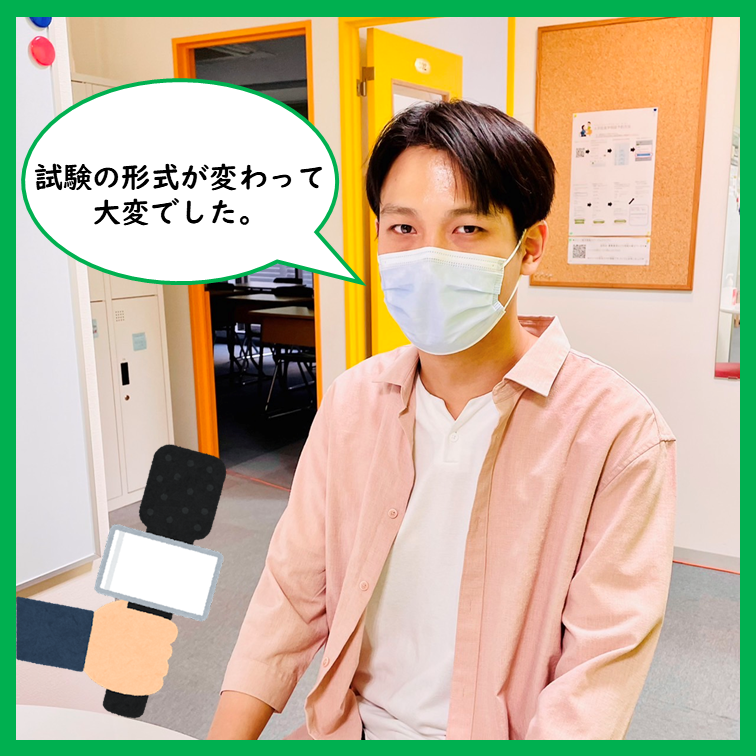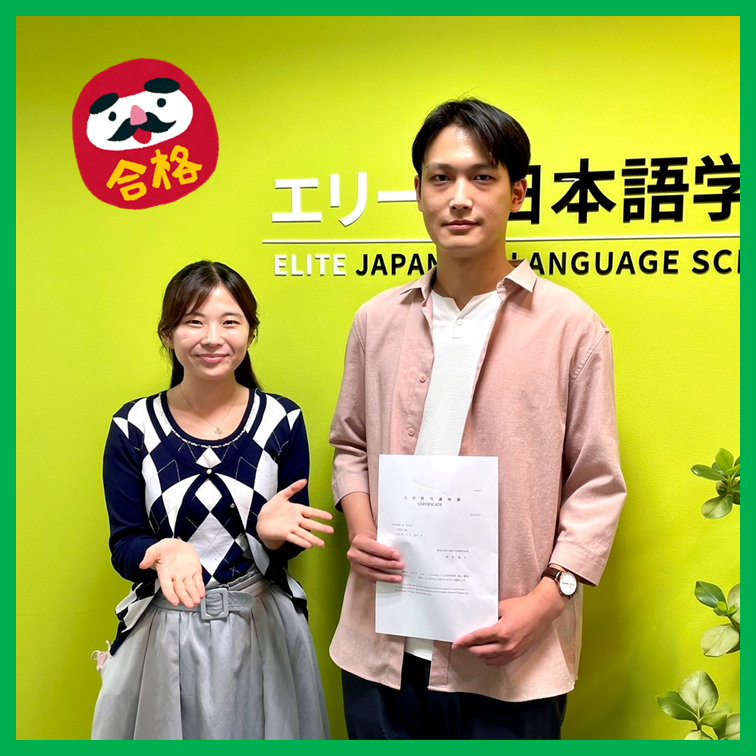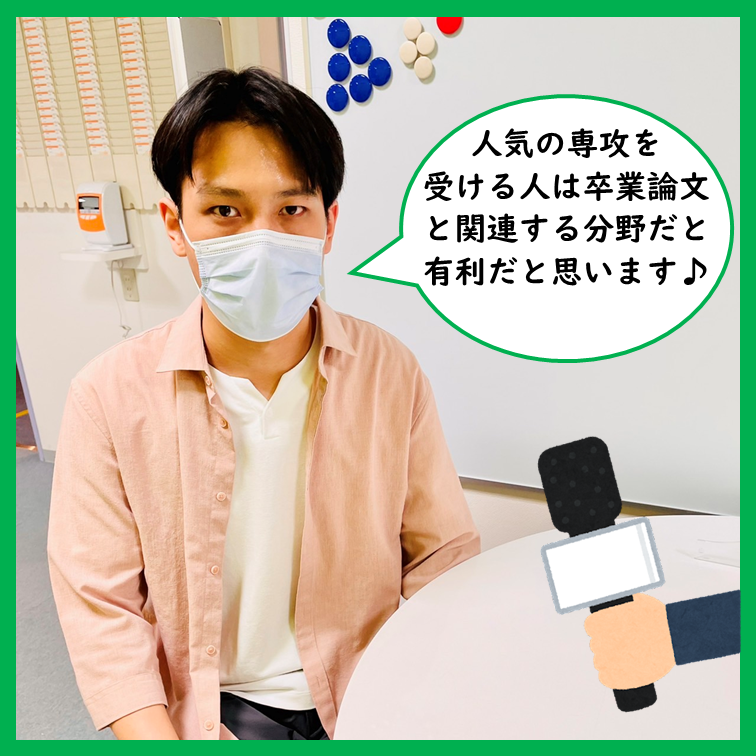Interview with a successful applicant at the University of Tokyo Graduate School
As of September 2021, there are 2 successful applicants going to the University of Tokyo Graduate School
We interviewed Mr. Zhang, who passed the Graduate School of Engineering.
We think it will be a good reference for students or for people who are thinking of
taking the exam.
※Safety protocols were followed and mask was removed only during the photoshoot
①Please tell us how you felt when you passed the test
I am extremely happy. I am still immersing myself in the joy of passing.
② Which part of taking the exam did you find difficult?
For me, personally, it’s Japanese. At first, I have spent most of my time studying and taking specialized Japanese studies/courses. One thing I have also noticed is the changes in the test due to the influence of the pandemic.
A good example would have to be this year’s math exam. The test changed from choosing 3 out of 6 fields to doing 6 fields, so that took a long time for me to review. Last year, physics changed from selecting 2 out of 4 fields to selecting 2 out of 2 fields. As for the field of electromagnetism, considering the fact that it was not tackled that much in the university, and assuming that last year’s exam is a completely different situation, however, when I checked the application guidelines/requirements back in June, I found out that it was considered an exam reform. In the end, I was not able to prepare for the subject on time and just memorized some of the formulas on the train right before my exam. The score that I got from this subject may not have been very good, but I was still able to pass the exams and I’m truly grateful for that.
③What do you think was the most useful/helpful thing you learned from Elite?
The biggest help was improving my Japanese, especially learning through conversations.
I have always loved conversing during classes, from the basic lessons that were taught to us I was able to make sentences by myself and was able to get a lot of chances and opportunities to practice and improve my conversation skills in Japanese.
In addition, I would always find it hard to notice the small difference between Japanese and Chinese characters, and our teachers would always point out during classes.
I believe one of the reasons why I was able to pass was because I was able maximize and use my time well to concentrate on studying Japanese and focus on preparing myself for the exams even when I’m not in class.
④What is something that you would you like to do or want to work hard at in graduate school?
I would like to broaden my knowledge and studies in Japanese and English while I also learn and advance my studies and research about robotics.
⑤What advice can you give to students/people who are and will be studying in Elite?
As much as you can, I think it is important to really strengthen your learning of Japanese language. I also think it’s better to finish taking the English exams or to be finished preparing for it before coming to Japan. Otherwise, it will be harder for you to prepare for the examinations and might not make it on time. Lastly, I think doing thesis research is also important. For example, if you are thinking of taking a well-known major such as robotics, I think it would be an advantage if your thesis is related to the course/field that you’re aiming for.
We interviewed Mr. Zhang, who passed the Graduate School of Engineering.
We think it will be a good reference for students or for people who are thinking of
taking the exam.
※Safety protocols were followed and mask was removed only during the photoshoot
①Please tell us how you felt when you passed the test
I am extremely happy. I am still immersing myself in the joy of passing.
② Which part of taking the exam did you find difficult?
For me, personally, it’s Japanese. At first, I have spent most of my time studying and taking specialized Japanese studies/courses. One thing I have also noticed is the changes in the test due to the influence of the pandemic.
A good example would have to be this year’s math exam. The test changed from choosing 3 out of 6 fields to doing 6 fields, so that took a long time for me to review. Last year, physics changed from selecting 2 out of 4 fields to selecting 2 out of 2 fields. As for the field of electromagnetism, considering the fact that it was not tackled that much in the university, and assuming that last year’s exam is a completely different situation, however, when I checked the application guidelines/requirements back in June, I found out that it was considered an exam reform. In the end, I was not able to prepare for the subject on time and just memorized some of the formulas on the train right before my exam. The score that I got from this subject may not have been very good, but I was still able to pass the exams and I’m truly grateful for that.
③What do you think was the most useful/helpful thing you learned from Elite?
The biggest help was improving my Japanese, especially learning through conversations.
I have always loved conversing during classes, from the basic lessons that were taught to us I was able to make sentences by myself and was able to get a lot of chances and opportunities to practice and improve my conversation skills in Japanese.
In addition, I would always find it hard to notice the small difference between Japanese and Chinese characters, and our teachers would always point out during classes.
I believe one of the reasons why I was able to pass was because I was able maximize and use my time well to concentrate on studying Japanese and focus on preparing myself for the exams even when I’m not in class.
④What is something that you would you like to do or want to work hard at in graduate school?
I would like to broaden my knowledge and studies in Japanese and English while I also learn and advance my studies and research about robotics.
⑤What advice can you give to students/people who are and will be studying in Elite?
As much as you can, I think it is important to really strengthen your learning of Japanese language. I also think it’s better to finish taking the English exams or to be finished preparing for it before coming to Japan. Otherwise, it will be harder for you to prepare for the examinations and might not make it on time. Lastly, I think doing thesis research is also important. For example, if you are thinking of taking a well-known major such as robotics, I think it would be an advantage if your thesis is related to the course/field that you’re aiming for.












